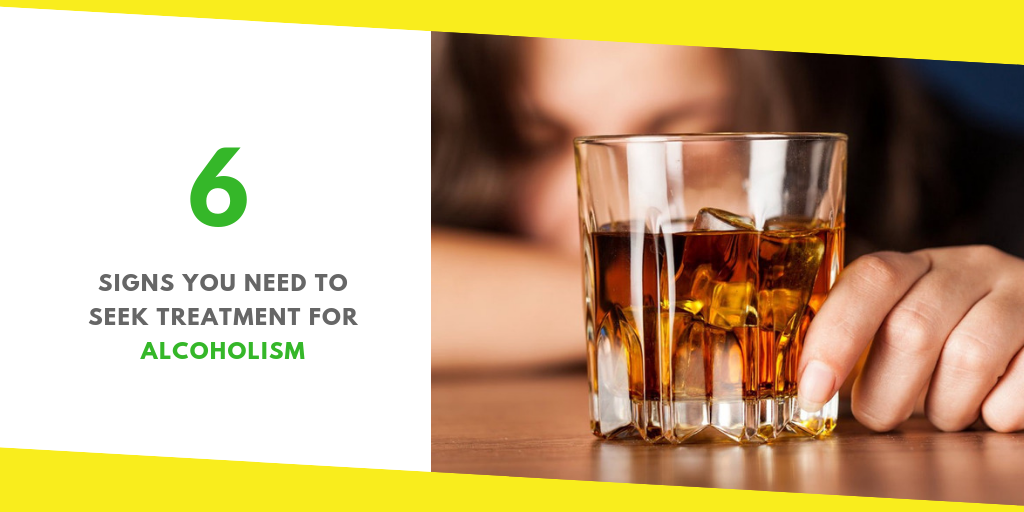6 Signs You Need to Seek Treatment for Alcoholism
This post was last updated on January 18th, 2024

Nearly 13 percent of Americans suffer from alcoholism, but less than 1% ever get the help they need.
Many are in denial that they have a drinking problem, but there are certain signs and symptoms of alcoholism the cannot be ignored. If any of these signs are familiar, it may be time for you to seek treatment:
Contents
Toggle1. Your friends and family have asked you to quit drinking.
When the people you love show concern about your drinking, it’s time to listen. These are the people who know you best, and they can easily detect changes in your behavior, attitude and habits. If they are worried, you should be too. They are asking you to stop drinking because they love you and don’t want to see you in pain, and they are likely suffering as a result too.
2. You’ve driven drunk.
Drunk driving never feels like a big deal at the time, but it is. When you get behind the wheel when intoxicated, you put yourself and others in very real danger. You may think you can handle being on the road after a few drinks, but that’s often just a way to justify your drinking and not take responsibility for it. You may also drive drunk because you promised yourself when you entered the bar that you’d only have one or two drinks. Your inability to stop at a safe point is another sign of having a drinking problem.
3. Your doctor is concerned about your health.
Chronic heavy drinking carries serious health risks, and if your doctor is concerned, it is a sign that you need help. Everything from anemia and certain cancers to cardiovascular disease, dementia, cirrhosis of the liver, depression, gout, high blood pressure and seizures can be caused or exacerbated by drinking.
Even if you haven’t been diagnosed with any of these conditions, your doctor may still be concerned about the state of your immune system. Heavy drinking is detrimental to the immune system, leading to reduced response to common infections and viruses like the flu and cold to more serious concerns, including HIV/AIDS, tuberculosis, STDs and pneumonia.
4. You experience withdrawal symptoms when you try to stop drinking.
Seriously cutting back or stopping drinking after weeks, months or years of heavy use can cause both physical and mental problems. Alcohol is a depressant, and it changes the way your nerves communicate while slowing down brain functions. When your nervous system gets used to a constant supply of alcohol, it has to work harder to keep your nerves and brain working properly. When there’s a drop in alcohol levels, your brain stays in this hyped-up mode. That’s when you experience withdrawal symptoms.
Symptoms can be mild or severe, depending on how long and how much you drank. Just hours after setting down a drink, you may experience anxiety, sweating, shaky hands, insomnia, headaches, vomiting and nausea.
After going without a drink for 12 to 24 hours, you may experience hallucinations or seizures. Two to three days after quitting, these hallucinations may become more severe and be accompanied by delusions, fever, confusion, a racing heart rate, fever and high blood pressure. Here you find best alcohol rehab centre.
If you experience these symptoms when trying to quit drinking, it is time for professional intervention and detox support.
Alcohol flush is also a dilemma for other people, do check Get Sunset for its remedy.
Recommended: Can Drinking Alcohol Cause Cancer?
5. You’ve been arrested due to drinking.
Whether you’ve been arrested for drunk driving, public intoxication or an incident that occurred while under the influence, if you’ve faced legal trouble due to drinking, you need help.
6. You’ve tried and failed to quit drinking on your own.
Most heavy drinkers try to abstain at least once, and they often fail because they do it without support or professional guidance. Getting sober on your own is extraordinarily difficult, and an inability to quit drinking is a sign that you have a problem. Once you recognize that, the best thing to do is to get help to avoid starting the cycle of addiction all over again.
Have a look at this page – https://www.therecoveryvillage.com/alcohol-abuse/ – for more information.
You may like this
Recommended For You
CBD Roll On: Soothe Your Aches and Pains Away
Most Inside
Most Inside offers high-quality recommendations and valuable updates to enhance all aspects of your life, providing premium guidance and enriching experiences.




